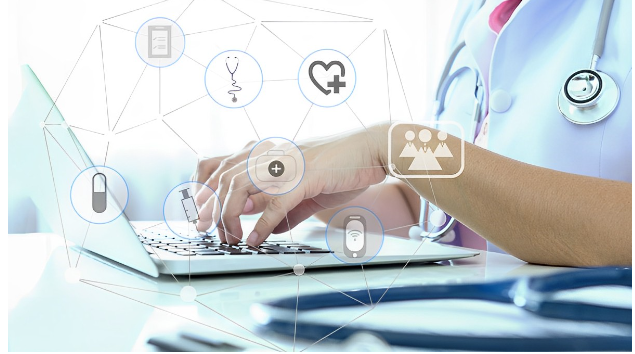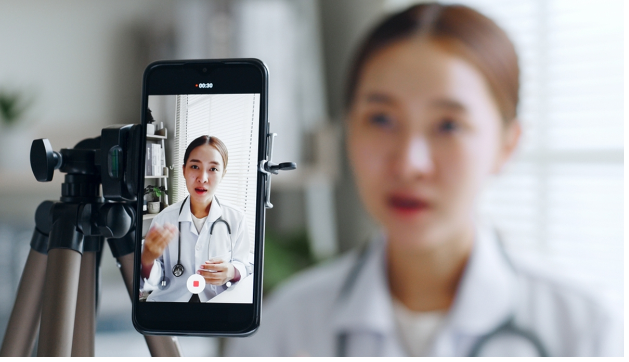The Ethical Implications of Using Social Media in Healthcare

Social media has made its way into pretty much all aspects of our lives. Healthcare is no exception. The uses and applications of social media in this industry are far-flung. Raising awareness, finding new patients, and establishing a solid online presence for a brand, can all be done through a single avenue, and that is social media.
On the other hand, it is also used by the general public to locate healthcare services and professionals near them. So any organization or professional who’s not on social media is missing out greatly on acquiring new opportunities and patients.
As much as using social media has become crucial to growing a brand, it equally poses ethical implications at the organizations’ end. It could also involve other risks such as the spread of false information and patients misdiagnosing themselves.
Perks of Social Media in Healthcare
If utilized the right way, social media has a lot to offer to the healthcare industry. Like other social media apps, maximizing Instagram likes can make healthcare providers’ content more visible and engaging in front of a wider audience. It can assist professionals in reforming policies, building a strong reputation in the community, and providing them with ample opportunities to thrive in the industry.
-
Raising Public Health Awareness
Social media proves to be really beneficial when it comes to raising awareness about public health. For example, if there is a viral within a particular region, information about necessary precautions, symptoms, and remedies can be posted on social media sites.

Apart from this, the masses can be informed about basic health guidelines using various content formats to engage the audience as well as get the message across. This could be helpful for teaching kids about simple healthy practices too.
Disseminating factual information at a time when it is needed the most is crucial to protecting people’s health. Social media makes the whole process much more convenient for both healthcare professionals and the general public.
Case Study: Mayo Clinic’s Patients Empowerment
Mayo Clinic started raising public health awareness through social media in 2006, when it launched its YouTube channel and now has 1 Million + subscribers. Since then, it has expanded its presence on other platforms, such as Facebook, Twitter, Instagram, and LinkedIn. Mayo Clinic has achieved big success through social media by focusing on empowering its followers to become better advocates for their health.
Instead of just promoting itself like many health systems do, Mayo Clinic has its followers take center stage. It uses social media to answer questions, share patient stories, and raise awareness for better health.
Some of the examples of Mayo Clinic’s successful social media campaigns are:
- The #AskMayoMom series, where a Mayo Clinic pediatrician answers common questions from parents about children’s health issues on Facebook Live.
- The #MayoClinicMinute videos, where a Mayo Clinic expert explains a health topic in 60 seconds or less on YouTube.
- The #MayoClinicRadio podcast, where a Mayo Clinic physician and a veteran broadcaster discuss the latest health and medical news on iTunes and iHeartRadio.
- The #MayoClinicConnect online community, where patients and caregivers can share their experiences and support each other on Mayo Clinic’s website.
-
Responding to Crises Effectively
Information on social media spreads like wildfire. Especially when it’s something related to an emergency or crisis, everybody shares it on their profiles like crazy. They do not take time to verify the information or the source it’s coming from. This enhances the risk of panic and false information being widespread in no time.
In case of health crises or emergency situations, social media can be used to keep things under control. Any information coming from a healthcare provider would have a stronger stance than information arising from random unverified sources. Moreover, organizations and professionals can employ social media networks to mitigate panic in public and provide them with the right guidance in such situations.
-
Improvising Communication
Sometimes, the general masses are not on the same page as healthcare professionals regarding a particular subject because the public is not as informed and knowledgeable. By using social media listening tools, healthcare providers can have a deeper look at the ongoing online discussions so they can educate the public about those subjects in a better way.
Tracking conversations happening around particular issues allows them to improvise their communication according to the audience’s needs. It allows them to know their opinions, answer common questions about those issues, and cater to the public’s concerns.

This data can be used to develop tailored communication strategies across various social media platforms to clarify any misunderstandings and provide them with appropriate guidelines.
-
Reaching New Patients
Just like people look for products they need to buy online, they look for a suitable healthcare provider near them on social media networks. For someone who has a solid presence on social media, it’s easier to attract new patients as compared to someone who is not actively using social media.
Interacting with people online and creating content relevant to your profession on a platform such as tiktok helps you connect and build meaningful relationships with them. You can also buy TikTok followers to boost your visibility across the platform. This way you can reach new patients easily and grow your network through referrals and word of mouth as well. It has a direct impact on developing your credibility and reputation among the community.
Social media, Healthcare, and Ethical Issues
While there are plenty of benefits to using social media in the healthcare industry, it has several ethical dilemmas attached to it as well. Let’s take a look at them.
-
Spread of Misinformation
Any out-of-the-blue information is very potent to spread rapidly across social media platforms. This enhances the prospects of the propagation of false information to a large number of people. Since social media is not controlled by a single entity, users are entirely in control of sharing whatever they want on their profiles.
It is also imperative to note here that the responsibility doesn’t entirely fall on the users, but also on various news-sharing sites who disseminate sensitive information without verifying. They do not understand the gravity of it and how it can pose serious threats to public health.
Furthermore, it gets harder to identify false information since there is an overwhelming amount of content being uploaded on social media every second. The facts and opinions are also contrastingly different in multiple sources so it’s hard to distinguish truthful information.
-
Wearables and Data Privacy
The advancement of technology has brought forth its own pros and cons. With wearable medical gadgets, as much as it has become easier to track and derive data, it has also raised questions about patient privacy and confidentiality. The wearables are often connected to smart devices through third-party apps which makes breaching patients’ data and privacy much easier.
Apart from wearables, there is a risk of privacy violation on social media platforms as well. Healthcare professionals should be well-trained to protect patients’ data and minimize the risk of data breaches. They should ensure patients’ confidentiality at any cost, take informed consent, and not let any private information about them out.
Case Study: Kaiser Permanente’s Data Breach
On April 5, 2022, Kaiser Permanente experienced a data breach that impacted 69,589 individuals. A hacker accessed patient information through a third-party app connected to wearable devices.
In response to the breach, Kaiser Permanente took the following actions:
- Implemented stricter data security protocols to prevent future incidents.
- Provided transparency to affected patients by notifying them of the breach and explaining the steps being taken to protect their information.
These actions helped Kaiser Permanente demonstrate its commitment to patient privacy and regain the trust of its patients.
-
Self-Diagnosis
Since it’s really easy to share information on social media networks, people may end up misdiagnosing themselves with whatever they read online. The symptoms of multiple diseases could overlap with each other. It’s not necessary that if someone comes across a post mentioning symptoms of a disease, and they are experiencing similar ones, it holds true for them.
It’s very easy to diagnose yourself by researching about it online, but since you are not a medical expert, you should really consider consulting one.
-
Online Communication
No matter how advanced the modes of communication get, nothing can compete with a face-to-face meeting. Although the use of social media in the healthcare industry has made things more convenient for both parties in terms of accessibility and guidance, it hasn’t replaced in-person examinations.
Sometimes when the communication between a healthcare professional and a patient takes place online, it can lead to ambiguity for both parties. Since body language cannot be observed in this case, it’s hard to judge the matter at times. It could lead to the patient misunderstanding the doctor’s instructions or the doctor misjudging the patient’s condition.
In A Nutshell
Like all other things, social media marketing in healthcare has its own pros and cons. You can utilize it to its maximum potential to build your reputation in the industry, reform policies, and raise public health awareness. This will assist you in improvising your communication strategies according to your audience’s needs.
However, there are some ethical challenges involved in social media in healthcare. These challenges are mainly related to public health risks, data breaches, and privacy violations. Some things are not under your control such as the spread of misinformation and negative feedback. It’s important for healthcare providers to be well-trained so they can minimize the risks for their patients.
